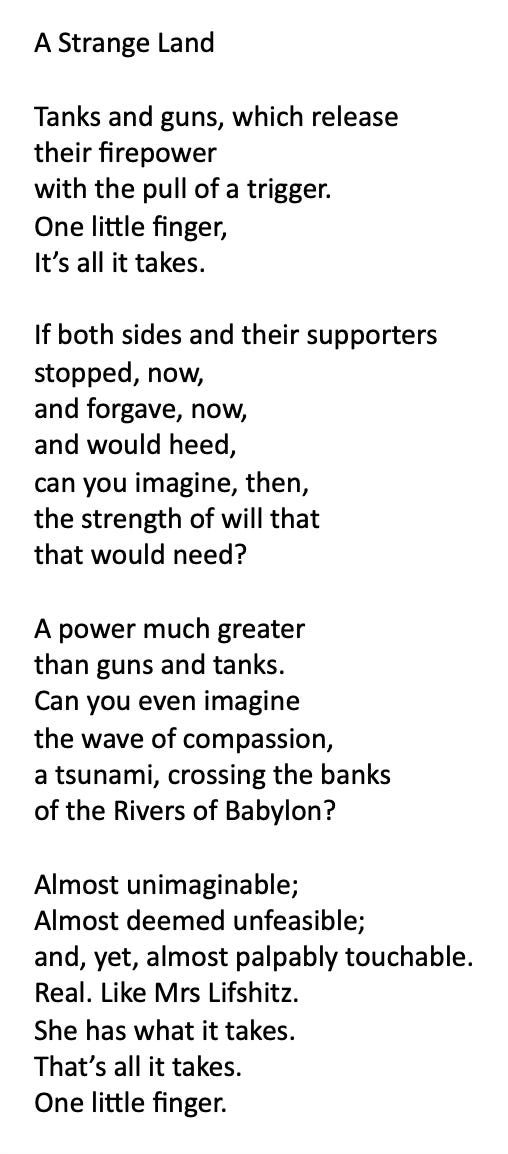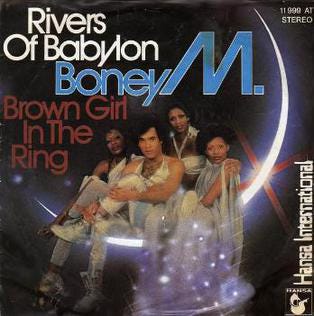Click above to listen to this article as a one-act play.
Babies can do as they please. They’re allowed to barf, poo, sleep and eat. And when they don’t get what they want, they cry, till they get it. Because they’re helpless and vulnerable and sweet and ours.
Everything a baby does is forgiven. We protect them and secure their environment and, when they wander into places they shouldn’t be, we chide them softly, so as not to upset them and cause tears and tantrums.
The same goes for those who are convalescing. If they’ve been through a dreadful illness, we make allowances. “There, there,” we say, as we pat the back of their hand with empathy. Those who have been wronged by fate can do no wrong.
But, over time, Uncle Frederick’s war wounds begin to pale a little. “Can’t he ever get up and fetch a fork himself?” “I fought for King and Country, didn’t I?” Yes, Uncle Frederick.
We lost six million in the Holocaust.
- Yes, we know. We’re sorry. We’re truly sorry you had to suffer that.
Well, I wasn’t myself in Auschwitz, but our people suffered none the less.
- Yes, they did. Dreadfully.
Hamas killed over a thousand of us.
- It was frightful. Awful. Those poor innocent people.
So, we are right to wipe out the scourge of human animals in Gaza.
- No, you’re not.
Mine is a high-level analysis. Helicopter view. Moralistic, airy-fairy, châteaux en Espagne, blue-eyed optimism, unrealistic, don’t I know how the real world works?
Don’t you know how the real mind works? We all have one. Surely, we all know how they work? Besides the nodes and the electrical impulses; of compassion and sympathy, which we work so hard to dampen, as if we need a brain with shock absorbers. Maybe we do.
We hear about conspiracy theories and manipulations, about hidden agendas, and corruption of officialdom. Of backhanders, and smoke screens, and politicians’ lies, and in all of those we believe; especially when it comes to jumping on band wagons and gravy trains. But we rarely include ourselves in such things. No, we dislike Mr Trump because, well, because he’s despicable. He is despicable. And Mr Putin, he’s despicable. Look at the evil he wreaks. Looks at the death he causes. Look at it and dare not to agree with me.
I agree with you. Mr Putin is despicable. Because I’ve seen the pictures and I’ve done the reading and I’ve watched as he set off bombs in Moscow apartment blocks to justify his attacks on Chechnya and South Ossetia—yes, he murdered his own citizens to justify murdering someone else’s, and I was watching back then; of course, so were you, but we were on different band wagons then, weren’t we? My boyfriend knew a Polish girl back in 1999 when Mr Putin became Prime Minister. I asked her, “So, whaddaya think of this new guy, Putin.” She mulled the question over for a minute—that long. “He’s okay, I guess.” That was the nicest anyone said about Mr Putin in 1999 anywhere near where I was—or since, for that matter: he’s okay, I guess.
Who was listening to Lady Thatcher?
“I looked at the pictures of Mr Putin and looked for a trace of humanity.” They laughed. They’d not laugh now.
I’ve read how he tipped umbrellas with sarin and strung up an opponent under a bridge in London. He and the likes of him did. KGB. Knights Grand Cross of the Bathtard.
But, when a band wagon gets rolling, even one whose sole occupant might at one time have been me, I jump off and observe it, this time from the outside. I question the church. I question leaders. I question acts of faith, and I question the holy. Scout masters and priests. MPs and PMs.
I don’t question drug dealers, though. I know what they want, and swathes of the society I live in give it to them. Cash for coke. Cash that is then admitted through the hallowed portals of esteemed city institutions in return for crisp, clean fivers, paid into accounts on BVI, New Zealand, Malta … maybe even Moscow, for all I know.
And how would I know? Well, because I know what temptation is: it’s been laid before me before now. By lawyers, by men of position, by officials. By drug dealers: I have been asked if I wanted to buy drugs. That’s the easiest temptation of all to rebuff: you say “No,” and they go away. They just go away. With the lawyers, the men of position, the officials, it wasn’t that easy. It was me who had to go away.
Ha! A conspiracy theorist! We have irrefutable proof of the evil, of the unremitting evil. Well, evil is as evil does. They are evil who sit on bodies like the United Nations and thwart the aims of its charter by blocking that organisation’s endeavours to fulfil its very raison d’être.
I read a sympathetic editorial in The Guardian newspaper. A lovely piece on the hostage Mrs Lifschitz, released by Hamas to go home. And then I disagreed. Because I saw a band wagon starting to roll.
What does that mean: “A peace activist, Ms Lifshitz’s views surely influenced her words, as probably did the knowledge that her husband was still being held by Hamas”?
The article is entitled: a freed hostage’s gesture should not be forgotten. Gesture? Surely influenced her words? I don’t think they understand.
In my vade mecum literary reference, A Man For All Seasons, the following exchange cautions us against describing acts of moral backbone as gestures. When Thomas More learns that the Church in Convocation has acquiesced in the Act of Settlement (aside from the then doomed Bishop Fisher), More removes his Chancellor’s chain of office, upon which his son-in-law-to-be says:
ROPER: Sir, you’ve made a noble gesture.
MORE: A gesture? I make no gesture! My God, I hope it’s understood, I make no gesture! Alice [his wife], you don’t think I would do this to you for a gesture! That’s a gesture! (Jerks up two fingers.) I’m no street acrobat to make gestures! I’m practical!
ROPER: You belittle yourself, sir; this was not practical; (resonant) this was moral!
MORE: Oh now I understand you, Will. Morality’s not practical. Morality’s gesture. A complicated gesture learned from books—that’s what you say, Alice, isn’t it … And you Meg [his daughter]?
MARGARET: It is, for most of us, Father.
MORE: Oh no, if you’re going to plead humility--! Oh, you’re cruel. I have a cruel family.
As Mennonites in 16th century Holland knew only too well, living life as Jesus taught us, by loving as we would be loved, could bring death. Amazing, especially when you know that the death was wrought by the church itself.
The tale of Dirk Willems is salutary on that score. Willems was imprisoned for being anabaptist, escaped and was chased across winter ice. He was so thin and hungered, he made it across, but his guard broke through and was drowning. Willems returned to aid his captor, was re-arrested, and burned at the stake. Because his anabaptism threatened the state’s hold over its people. It was no gesture that Willems made. It was his belief, and it cost him his freedom, and his life, and much pain in the losing of it.
Mennonites and those who love their enemy (there’s no suggestion here of a Stockholm Syndrome in Mrs Lifshitz’s case) are not influenced; they have deep-seated belief in who they are and who we all are. That’s how their minds work.
If The Guardian newspaper senses strategic considerations on her part–concern for her husband–then The Guardian itself forgets that there are those who forgive because … they forgive. Not for goals, but because the power of forgiving, like that of giving, inures to the benefit, not of the recipient, but far more to them who give and forgive. Did you never realise why the Magi came to visit the baby Jesus?
Fair use, https://en.wikipedia.org/w/index.php?curid=12237180





